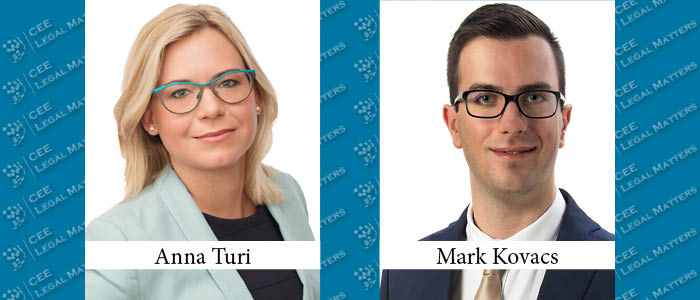Crucial amendments to the Hungarian Competition Act entered into force on 1 January 2023, while others will on 1 February 2023. This article briefly describes the most important changes.
Amendments concerning the merger control proceeding
1. Thresholds and fees
Most importantly for those dealing with merger control assessments and notifications, the merger notification thresholds and procedural fees have increased
Until the end of 2022, a merger had to be notified if the combined Hungarian turnover of the groups concerned .
Following the amendment, the combined turnover threshold will be increased to HUF 20bln (approx. EUR 50m) from HUF 15bln (approx. EUR 37.5m), while the individual threshold will be increased from HUF 1bln (approx. EUR 2.5m) to HUF 1.5bln (approx. EUR 3.75m).
Procedural fees will also increase. The fee for a "Phase I" competition procedure will increase from HUF 3m to HUF 4m (approx. EUR 10,000), while the fee for a "Phase II" procedure will rise from HUF 15m to HUF 19m (approx. EUR 47,500). However, the fee for fast-track notification (HUF 1m, approx. EUR 2500), in which most of the mergers are cleared, has not increased.
The legislator justified the increase on the grounds of inflation.
2. Penalties for breach of the duty to notify or the standstill obligation ("gun jumping")
Rules on fines to be imposed for non-notified mergers or where the transaction was closed before clearance have also changed. The good news for the companies concerned is that the minimum fine has been abolished, so the Hungarian Competition Authority (HCA) can even refrain from imposing the fine in certain cases. At the same time, the maximum daily fine will be increased from HUF 200,000 to HUF 300,000 (approx. EUR 750), which the legislator also justifies by citing inflation, as the previous amount was no longer a sufficient deterrent.
3. Clarification of the voluntary regime and others
In addition, at the request of the industry, the legislator has clarified that if the mandatory notification thresholds are not met, the notification of mergers exceeding a HUF 5bln combined threshold is indeed a voluntary option and not an obligation, even if it is unclear whether the merger will have adverse competitive effects.
Furthermore, the legislator solves a previous problem of practical interpretation of the law by clarifying from which date the turnover thresholds are to be calculated when the merger is notified by the parties, and from which date if the transaction is subject to an ex officio investigation by the HCA, i.e. exactly which financial year will be relevant to calculate the turnover thresholds.
Furthermore, certain transactions of investment funds and private equity firms have been included in the exemptions from notification.
The HCA's new tool: letter of formal notice
From 1 January 2023 the President of the HCA will have a new tool to enforce compliance: a letter of formal notice to express concerns about suspected infringing conduct.
This will be possible in cases where, in the absence of sufficient information and evidence, there is no reasonable likelihood of an infringement, but where market developments give rise to a suspicion of illegal behaviour.
The letter of formal notice will not be part of the competition supervision procedure, nor will it lead to the establishment of an infringement. The HCA may refrain from the formal opening of competition supervision proceedings if the undertaking concerned successfully dispels the HCA's doubts about the infringement in its reply to the letter of formal notice or brings its conduct into line with the legal requirements. Interestingly, the HCA will also publish on its website a list of the alleged infringements, the relevant market and the number of letters of formal notice sent in the year under review, without mentioning the names of the addressees. In this way, market players will also be able to find out from the HCA's website what conducts the authority is concerned about.
New powers for the HCA regarding new EU digital markets legislation
The new Digital Markets Act ("DMA") regulation is designed to ensure that the big online content platforms, known as "gatekeepers", operate fairly. If they do not, the European Commission or the authorities designated by the Member States may take action against them. In Hungary, the HCA has been appointed as the competent authority and will have to cooperate closely with the European Commission in its proceedings.
The HCA will be able to open competition proceedings to determine whether the conduct of the gatekeeper company meets the requirements of the DMA regulation. A new chapter of the Competition Act will set out detailed procedural rules.
Entry into force of the new amendments, final remarks
The increase in the merger notification thresholds will reduce the burden on the HCA, as the legislator expects the number of notifications to fall by around 10-15 %. In 2021, a total of 68 mergers were notified to the HCA, so the number of notifications the competition authority will have to deal with is likely to decrease by 8-10 cases per year.
Some of the freed-up resources are expected to be used for the new powers – monitoring the activities of gatekeeper companies and sending letters of formal notice.
Most of the above provisions entered into force on 1 January 2023. However, the increase in the administrative service fee for mergers and the changes in the fines for "gun jumping" will only apply from 1 February 2023.
Companies should check carefully whether the mergers they plan to conclude in the near future are in fact notifiable based on the new thresholds.
By Anna Turi, Counsel, and Mark Kovacs, Attorney at Law, Schoenherr



